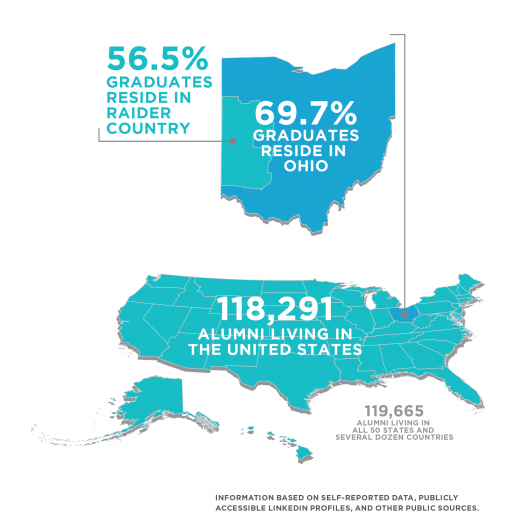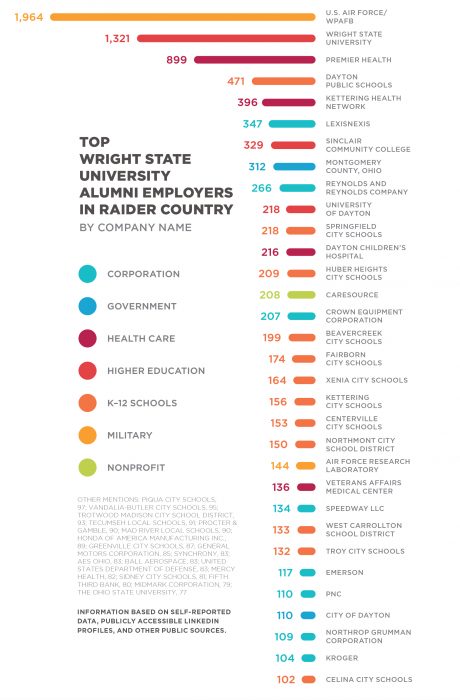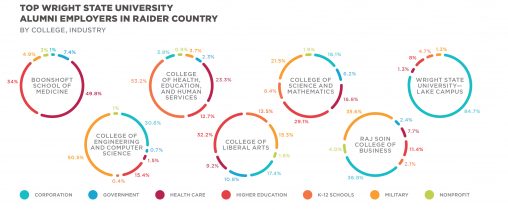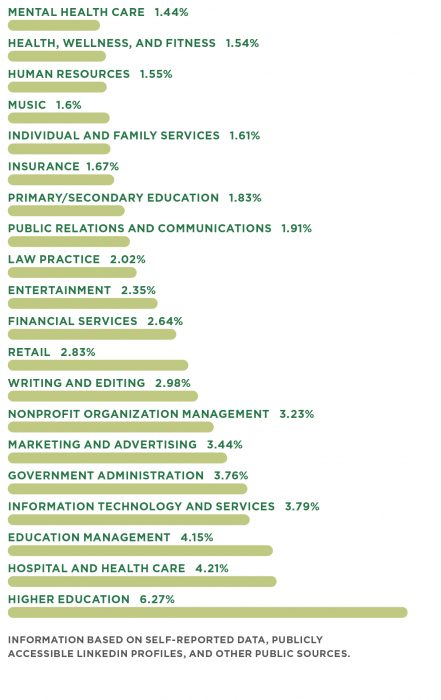Wright State makes a major impact on the local region by employing over 2,000 faculty and staff, drawing visitors to various events, conducting research with area partners, and sustaining operations on two campuses. However, the university’s greatest economic impact comes from the creativity, entrepreneurship, experience, and innovation provided by alumni.
While attending Wright State, students gain invaluable education, learn new talents, and garner strategic knowledge they take into the workforce. Their employers enjoy the benefit of increased productivity, and alumni, in turn, are able to command higher wages.
Wright State has 119,665 alumni living in all 50 states and several dozen countries. More than two-thirds of our alumni—69.7 percent or 83,361 graduates—chose to stay in Ohio. As well, 56.5 percent of Wright State graduates, or 67,654 alumni, make their living in Raider Country, the contiguous 16-county region in western Ohio anchored by the Dayton Campus and the Lake Campus.
The Wright State Alumni Association works hard to maintain employment information on graduates, gathering such information through news releases, event registrations, and alumni surveys. Employment data is augmented with information from publicly available LinkedIn profiles. As a result, Wright State has employment history on 63.4 percent, or 75,906, of the university’s living alumni. This employment database speaks volumes about our alumni’s impact on the region and beyond.
Fueling the Workforce and Sustaining the Region
Based on available data, Raider alumni make vital contributions to the area’s major employers. The top employers of Wright State alumni living in Raider Country are a mix of 19 school systems, 16 corporations, four higher education institutions, three military organizations, two government entities, and one nonprofit organization.
Those top employers collectively employ 11,456 alumni. A quarter of those alumni (2,895) work in K–12 school systems. Nearly a fifth (19 percent or 2,191) work for the military. Half are employed with various corporations (18 percent or 2,066), in higher education (17 percent or 1,945), or at one of five major health care systems (15 percent
or 1,729).
A closer look reveals insights about where alumni from Wright State’s various colleges and schools thrive in the workforce.
Graduates from the College of Liberal Arts are among the most diversified, dispersed among higher education (32 percent), corporations (17 percent), military (15 percent), and K–12 schools (13 percent). See the final section of this article for more on where College of Liberal Arts graduates work and how Wright State prepares them to find their best career paths.
Wright State: Educating Tomorrow’s Entrepreneurs and Executives
Thousands of skilled employees graduate from Wright State to join the labor force each year. Wright State provides industries in the region and beyond with dynamic leaders and bold entrepreneurs. According to alumni data, 1,857 alumni list “owner” or “founder” as their job title. These businesses span a wealth of industries, including health, wellness, and fitness; marketing and advertising; hospital and health care; and information technology and services, to name a few.
In Raider Country alone, there are 938 business founders and owners who are Wright State alumni. Their generated revenue and the number of jobs created by those businesses make an enduring impact on the region.
Wright State alumni also serve as industry leaders. Based on university records, 894 alumni have C-suite executive titles, such as chief executive officer, chief financial officer, chief human resources officer, and chief marketing officer. Alumni in these senior-ranking positions are responsible for making key strategic decisions about their company’s future direction. In Raider Country, there are 427 such C-suite executive alumni.
Student Success: Linking Students with Future Employers
At Wright State, a student’s path to employment can start as early as the first year. The Division of Student Success offers students and alumni many resources to secure the right career path. Each year, Student Success hosts 50 to 75 workshops on various topics, such as professional personal branding and how to network more effectively.
Student Success hosts two career fairs each year. “We generally have 40 industries represented at these events,” said Lance W. Cauley, associate director of career services. “We try to have something for everyone.”
Student Success also holds large-scale specialized events, such as Educators of Tomorrow for education majors and the Digital Mixer for students and alumni in the tech field.
Perhaps most importantly, Student Success offers one-on-one career counseling. “We call it career education,” Cauley said. “Our career consultants meet individually with an average of 1,000 students per year.” During these one-on-one sessions, students gain career development skills and learn how to transform their interests and passions into meaningful careers.
Student Success also works directly with companies and organizations seeking to hire Wright State graduates.
“Part of our role is to help employers brand themselves on campus,” Cauley said. Potential employers can visit campus to recruit students and work with Student Success staff to send specialized messages with career opportunities to specific alumni and students. “Right now, the labor market is really healthy,” Cauley said. “We very frequently have more opportunities than students who can apply.”
Partnering for Growth: The AES Smart Operations Center
A perfect example of how Wright State’s partnership benefits area businesses is the collaboration with the AES Smart Operations Center at MacGregor Park in Dayton. AES Ohio, a subsidiary of The AES Corporation (NYSE: AES), opened this state-of-the-art facility in 2021. It’s the first of its kind in the United States, and AES’s decision to locate it in Dayton is a testament to the skills, talent, and innovation culture of the region.
When AES was researching potential locations for the center, Dayton was competing against cities such as Atlanta and Indianapolis. Dayton secured the site, in part, because of the number of respected academic institutions in the region.
“During that process, it was important for us to share some of our community partners we work alongside, demonstrating the AES engagement in our community,” said Holly Wiggins, director of community and corporate social responsibility for AES Ohio. “The Wright State partnership was discussed on several occasions.”
The staff at the AES Smart Operations Center uses data analytics and modeling to improve efficiency of electric operations across the company’s global portfolio. To run this impressive operation, AES needs technology engineers, data scientists, and a variety of other professionals.
“It isn’t always prudent to have to look outside your area to find the best and the brightest,” Wiggins said. “So having our universities engage their students with local opportunities that support their career goals is important to us. That’s where Wright State plays a significant role. Our collaboration will groom current interns or co-ops and attract new employees.”
Answering the age-old question: What can I do with a liberal arts degree?
Liberal arts alumni thrive in a diverse range of industries. Wright State has employment information on 62 percent of College of Liberal Arts alumni, and industry information on 38 percent. The industries with the highest concentrations of liberal arts graduates:
Wayne Stark, director of workforce development for the College of Liberal Arts, credits much of the career success to the commitment of its faculty and alumni.
“Our faculty act as true partners in finding and supervising internships,” Stark said. “Also, the alumni come to events and programs and into classrooms and serve on panels. The alumni are very involved… That’s how we all really work together. It’s a process of combining academics with career development.”
Another key factor for graduates finding success in the workplace is that more employers increasingly seek the talents of these liberal arts alumni.
“The skills that you learn from a liberal arts education are the skills that are lacking in the workplace,” said Lance W. Cauley, associate director of career services in the university’s Division of Student Success. “Employers want those soft skills. They love the professionalism that comes out of the College of Liberal Arts.”





 Walking through open doors
Walking through open doors  Adventures await
Adventures await  Wright State to expand nursing facilities to meet workforce needs and prepare more graduates for in-demand careers
Wright State to expand nursing facilities to meet workforce needs and prepare more graduates for in-demand careers  Wright State student-athletes make a lasting impact on local family with more to come
Wright State student-athletes make a lasting impact on local family with more to come  Wright State names Rajneesh Suri dean of Raj Soin College of Business
Wright State names Rajneesh Suri dean of Raj Soin College of Business 